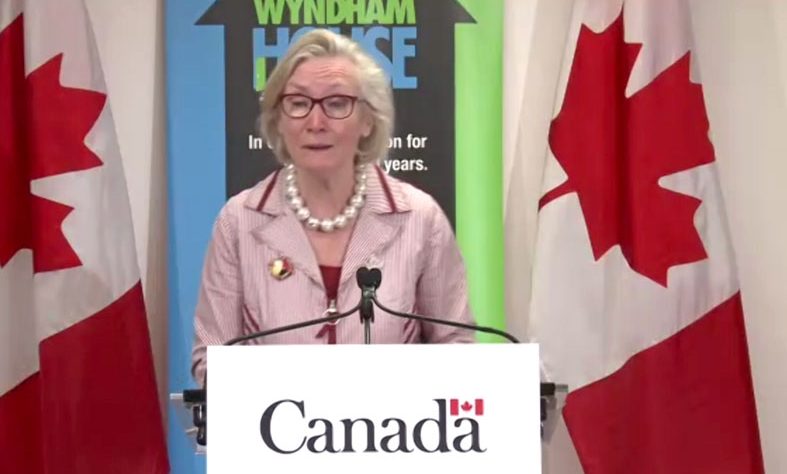GUELPH – The federal government announced over $3 million in funding to local agencies that serve the drug addicted community in Guelph, Wellington and Dufferin counties at a media event on July 25.
Minister of Mental Health and Addictions Carolyn Bennett was at Wyndham House in Guelph to announce the funding and share her optimism that a new way of treating clients will improve, and hopefully end, the opioid crisis.
The strategy is to coordinate activities of service providers for wrap-around care, to meet people where they’re at without judgement, and to have the ability to scale up or down according to need, Bennett said.
“We’re here to celebrate a cluster of great things,” Bennett said.
She noted the funding will be distributed as follows:
- $1 million to Wyndham House for its concurrent specialized youth hub;
- $149,000 to the Canadian Mental Health Association Waterloo-Wellington branch for training for its peer support program;
- $207,500 to Stonehenge for its peer-to-peer overdose response program;
- $153,000 to HIV/AIDS Resources and Community Health (ARCH) for its outreach program;
- $1.3 million to the Guelph Community Health Centre for its safer supply program; and
- $560,000 between the Guelph Community Health Centre and Stonehenge to start a safer supply program in Wellington County.
Opioid use is on the rise – especially during the pandemic when so many support programs were offered online only or not at all.
Bennett said 7,500 people in Canada died from opioid overdoses in 2021 and that makes it a public health crisis.
“This is about a toxic, deadly supply of drugs,” she said. “Every day overdoses grow and take over lives.”
She said debate in the House of Commons has shown that more people are personally affected by it as even MPs have said addiction has touched their lives.
“This is a ‘us’ problem, not a ‘them’ problem,” Bennett said. “We’re building consensus on how to respond.”
The agencies receiving funding are already collaborating on substance abuse issues in the region and Bennett said these kind of integrated services will better serve individuals with wrap-around care.
“We have to change the system rather than blame individuals for not finding services,” she said.
Guelph MP Lloyd Longfield said substance abuse issues are often connected to poverty, homelessness and mental illness, and the solution needs to be multi-pronged as well.
“It has to be separated from the criminal justice system though,” Longfield said. “We have to collaborate, and we have to use best practices.”
Kristen Cairney is the program director at Wyndham House, an agency that caters to homeless youth and youth at risk.
She referred to the “Bermuda Triangle of omission” – where youth are not ill enough, not poor enough and not addicted enough for some supports and services.
Cairney said agencies in the city came together to analyze the gaps and came up with the concurrent specialized youth hub concept, so youth can see a nurse, a case manager, get counselling and housing all under one shared care plan.
“They can access all their service needs under one roof,” she said.
“Collaboration has been the magic ingredient. It is within reach to end chronic youth homelessness,” she said.
Wyndham House will use its funding to expand the program.
In an interview after the press conference, Kristin Kerr, executive director of Stonehenge, said her agency and the Guelph Community Health Centre will work together to deliver the safer supply program in rural Wellington County.
The health centre already operates such a program in Guelph and Stonehenge already runs the RAAM program – Rapid Access Addiction Clinics – in the county.
The mobile clinics are in the county three days a week – Monday mornings in Erin, Monday afternoons in Rockwood, Wednesday afternoons in Arthur, in Thursday afternoons in Palmerston, although that location is currently on hold.
Additional services, like doctors who can prescribe medication, and counsellors who can help someone at risk of overdose, will operate from the RAAM mobile clinics as well under this new partnership.
“Substance abuse and addiction are health issues,” Kerr said.
“It’s not behavioural or immoral. Tax money is meant to create more health options for the people who need them.”
She added, “COVID-19 has contributed to a rise in substance use and isolation, and the drug supply on the street is too often poisoned, putting community members at significant risk of fatal overdose.
“This funding will help us address the gaps in harm reduction tools that continue to exist for rural residents.”
Stonehenge launched the safer supply program in June 2022, operating out of its Mount Forest office location at 229 Main St. S.
The program will also be accessible through any of the RAAM clinic locations.
Visit www.raamww.ca or call 1-844-722-2977 for more information.




